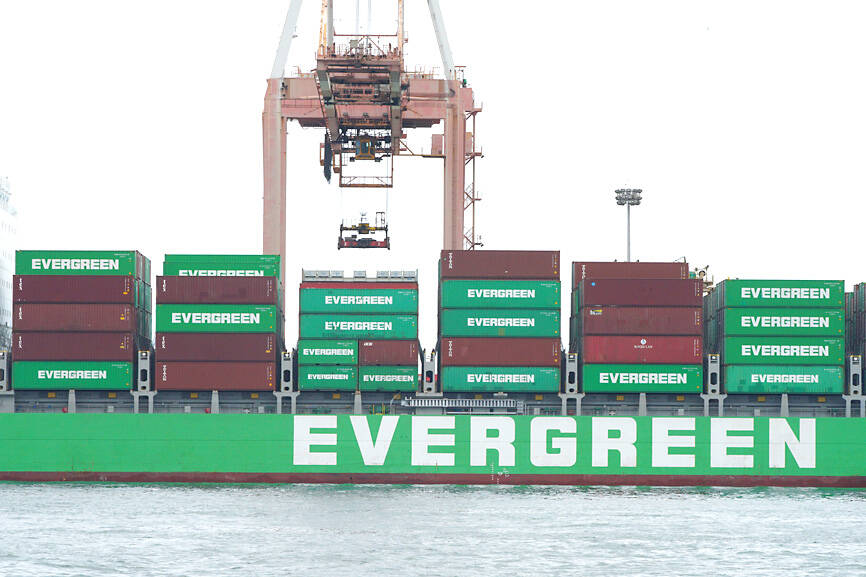Export orders last month dropped 4.6 percent year-on-year to US$52.87 billion, marking the 14th month of consecutive declines, the Ministry of Economic Affairs (MOEA) said in a report yesterday.
The decline was at the lower end of the 4.3 percent to 7.9 percent the ministry forecast a month ago, and was also lower than the 15.6 percent decrease recorded in September.
On a monthly basis, export orders — an indicator of product and component shipments to overseas markets over the following one to three months — increased for a second straight month at 2.9 percent, the ministry said.

Photo: CNA
Even though the latest data present signs of gradual improvement in export orders, the ministry remains cautious about the outlook for orders received by Taiwanese firms in the near term, the report said, citing slowing end-market demand and continued inventory adjustments as the global economy is still affected by high inflation and the spillover effect of monetary tightening by central banks, while uncertainties such as the US-China rivalry, the Russia-Ukraine war and the Israeli-Hamas conflict persist.
Last month’s figure brought combined export orders in the first 10 months of the year down 17.3 percent year-on-year to US$466.6 billion, the ministry said. This month, export orders are forecast to decrease up to 3.5 percent monthly, but increase 1.7 to 5.7 percent annually to between US$51 billion and US$53 billion, it said.
In a recent poll of domestic manufacturers by the ministry, only 15.7 percent of respondents were optimistic that export orders would increase this month from last month, while 58.2 percent said that orders would be flat from last month and 26.1 percent expected further decline, the report said.
The latest data showed export orders for information and communications technology (ICT) products last month fell 5.2 percent year-on-year, while orders for electronic goods edged down 0.3 percent from a year earlier as increased shipments of servers, graphics cards and chips were offset by slowing demand for notebook computers, networking and communications devices, printed circuit boards, and IC packaging and testing services, the report said.
Optoelectronics products last month posted a 13.8 percent annual increase as prices of flat panels rose and demand for camera lenses improved, it said.
Firms in non-tech sectors continued a downtrend amid adverse macroeconomic conditions, with orders for basic metals, machinery goods, plastics and chemical products last month shrinking from the same period last year by 5.4 percent, 12.8 percent, 6.9 percent and 11.5 percent respectively.
Last month, orders from Southeast Asia registered the largest annual increase of 94.9 percent, followed by a rise of 1.2 percent in orders from China (including Hong Kong). However, orders from Europe posted the largest annual decline of 45.8 percent, compared with a drop of 17.6 percent in orders from Japan and a 1.4 percent fall in orders from the US, the report said.
Meanwhile, 53 percent of all export orders last month received by local manufacturers were for products from overseas factories, down 2 percentage points from a year earlier, as several ICT and electronics makers moved production back to Taiwan, the report found.

Semiconductor business between Taiwan and the US is a “win-win” model for both sides given the high level of complementarity, the government said yesterday responding to tariff threats from US President Donald Trump. Home to the world’s largest contract chipmaker, Taiwan Semiconductor Manufacturing Co (TSMC, 台積電), Taiwan is a key link in the global technology supply chain for companies such as Apple Inc and Nvidia Corp. Trump said on Monday he plans to impose tariffs on imported chips, pharmaceuticals and steel in an effort to get the producers to make them in the US. “Taiwan and the US semiconductor and other technology industries

SMALL AND EFFICIENT: The Chinese AI app’s initial success has spurred worries in the US that its tech giants’ massive AI spending needs re-evaluation, a market strategist said Chinese artificial intelligence (AI) start-up DeepSeek’s (深度求索) eponymous AI assistant rocketed to the top of Apple Inc’s iPhone download charts, stirring doubts in Silicon Valley about the strength of the US’ technological dominance. The app’s underlying AI model is widely seen as competitive with OpenAI and Meta Platforms Inc’s latest. Its claim that it cost much less to train and develop triggered share moves across Asia’s supply chain. Chinese tech firms linked to DeepSeek, such as Iflytek Co (科大訊飛), surged yesterday, while chipmaking tool makers like Advantest Corp slumped on the potential threat to demand for Nvidia Corp’s AI accelerators. US stock

The US Federal Reserve is expected to announce a pause in rate cuts on Wednesday, as policymakers look to continue tackling inflation under close and vocal scrutiny from US President Donald Trump. The Fed cut its key lending rate by a full percentage point in the final four months of last year and indicated it would move more cautiously going forward amid an uptick in inflation away from its long-term target of 2 percent. “I think they will do nothing, and I think they should do nothing,” Federal Reserve Bank of St Louis former president Jim Bullard said. “I think the

SUBSIDIES: The nominee for commerce secretary indicated the Trump administration wants to put its stamp on the plan, but not unravel it entirely US President Donald Trump’s pick to lead the agency in charge of a US$52 billion semiconductor subsidy program declined to give it unqualified support, raising questions about the disbursement of funds to companies like Intel Corp and Taiwan Semiconductor Manufacturing Co (台積電). “I can’t say that I can honor something I haven’t read,” Howard Lutnick, Trump’s nominee for commerce secretary, said of the binding CHIPS and Science Act awards in a confirmation hearing on Wednesday. “To the extent monies have been disbursed, I would commit to rigorously enforcing documents that have been signed by those companies to make sure we get